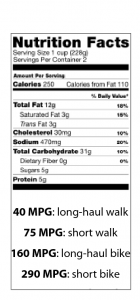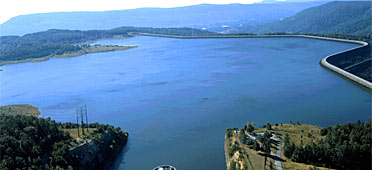 On Do the Math, three previous posts have focused on transportation efficiency of gasoline cars, electric cars, and on the practicalities of solar-powered cars. What about personal-powered transport—namely, walking and biking? After stuffing myself over Thanksgiving, I am curious to know how potent human fuel can be. How many miles per gallon do we get as our own engines of transportation?
On Do the Math, three previous posts have focused on transportation efficiency of gasoline cars, electric cars, and on the practicalities of solar-powered cars. What about personal-powered transport—namely, walking and biking? After stuffing myself over Thanksgiving, I am curious to know how potent human fuel can be. How many miles per gallon do we get as our own engines of transportation?
Okay, the “miles” part is straightforward. And we can handle the “per.” But what’s up with the gallon? A gallon of what? Here we have all kinds of options, as humans are flex-fuel machines. But food energy is not much different from fossil fuel energy in terms of energy density.
Views: 60835




